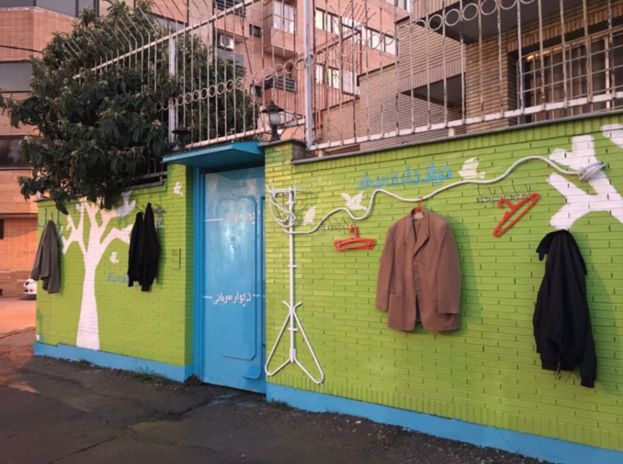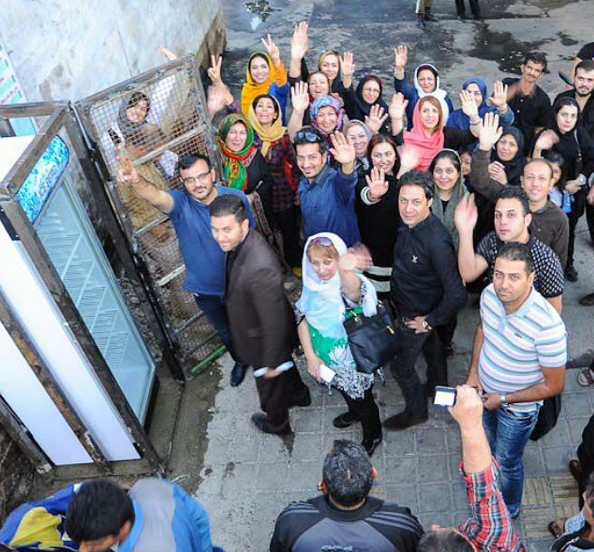December 25, 2015

Many Iranians have turned to new acts of personal charity this year in an effort to address poverty and homelessness on their own and beyond state control.
The latest manifestation is something called “walls of kindness” where individual families hang clothing from the compound walls of their homes to benefit the poor.

The BBC says the idea seems to have started in Mashhad, where someone installed a few hooks and hangers on a wall, next to the words: “If you don’t need it, leave it. If you need it, take it.” Donations of coats, trousers and other warm clothing started to appear on other compound walls.
The idea quickly spread to other cities, fueled by publicity on social media.
Photos of walls have been posted on Instagram and other social media along with exhortations not to “let any [homeless people] shiver in the cold this winter.”
One Facebook user wrote, “Walls remind us of separation, but in some streets in Shiraz they brought people closer to each other.”
The “wall of kindness” idea is similar to another citizen-driven initiative, called “Payan-e Kartonkhabi”, “ending home-lessness” or more literally ending sleeping on cardboard boxes, where fridges have been installed in poor neighborhoods so that people can leave food for the homeless.
The clothing on walls and food in fridges are also political statements of lack of faith in government anti-poverty efforts but also in the mosques, which historically have been the main funnel for charity in Iran.
According to the publication Tehran Bureau, more than 10 official organizations receive government funding to tackle homelessness, including the Tehran Municipality, the Welfare Organization, and Islamic Republic of Iran Broadcasting. But there is no transparency on what any organization does. Every now and then an official complains about the failure of those charged with helping the home-less.
“No one wants to take real responsibility for homeless people,” says Ali Heidari, who organizes a refrigerator program. “The police say it’s the muni-cipality’s responsibility, the municipality passes the responsibility to the Welfare Organization, and they say the Interior Ministry should deal with them.”
There is no overall state plan for dealing with homelessness, and the homeless have no specific legal rights. As many homeless people are addicted to drugs, the state applies laws and policies on drug addiction.
With all these complications making it difficult to officially address homelessness, Heidari decided to act. “The most necessary thing is nutrition,” he told Tehran Bureau. “If a homeless person is well fed, he or she won’t so easily collapse and die.”
After going to friends and relatives, he used social media to ask for help. On a Wednesday in July, the first group of volunteers went to south Tehran and distributed food. This is now regular. Every Wednesday, at 10 p.m., volunteers take thousands of meals to the Shush neighborhood. “Our record is 5,000 meals in one night,” said Heidari.
This program is almost identical to feeding programs organized all over the United States by private charities and churches. The public refrigerator element is a new one apparently unique to Iran.
Heidari’s group has not yet been registered as an NGO, which is a time-consuming process. But even without registration Payan-e Kartonkhabi is now active in more than 20 cities, including Tabriz, Esfahan, Kermanshah, Arak and Shiraz, thanks to Instagram, Facebook and, mostly, Telegram.
“It’s through Telegram that we are able to expand our activities to other cities,” said Heidari. “As soon as at least three people from one city announce their willingness to cooperate, we create a specific Telegram page for that city and they start their activities.”
The installing of fridges began in October. The idea is simple: those who can afford it will put food in the fridge, and anyone who’s hungry, be it a homeless person or a neighbor, can open the fridge and take something to eat.
After getting the approval from the municipality, the first fridge was installed in Tehran’s Shush neighborhood.
“At the beginning, some were pessimistic,” recalled Heidari. “Shush is known for theft, so some were saying that in less than 24 hours every part of the fridge would be stolen. Some were also saying, one person might come and take all the food and leave nothing for others. None of this has happened.”
The refrigerator effort has required some organization, while the “walls of kindness” operate at no higher level of organization than the family and the wall around its home. It is individual initiative that requires no state permission and no professional expertise—beyond the ability to hammer nails into one’s compound wall from which to hang clothing.
Some have taken this spontaneous show of charity as a sign that the government isn’t living up to its pledges.
“People are helping each other out in a country with so much wealth. Those in charge seem not to share similar concerns as that of the people,” said one Facebook user. Another complained, “If only we had wise and caring statesmen, we would not have a single needy person in this country with this amount wealth we have.”
Historically, charity has been handled chiefly through mosques in Iran, but many mosques have become politicized since the revolution so many among the public are now divorced from the mosque structure.
The “walls of kindness” and refrigerators are promoted primarily through social media and are an example of how social media are enabling citizens in a country pinned down under the state’s thumb to function and communicate widely beyond state controls. In Iran, broadcasting is a state monopoly and the press is subject to severe censorship. But social media have opened up a new sphere beyond state control.
In the West, social media are more for personal expression. But, in a controlled state, social media are a means of getting around state controls.
One comment on Facebook read: “We, the people, are the media. By sharing [photos] of these kindness walls, we showed that we make the news, if we are resilient.”
